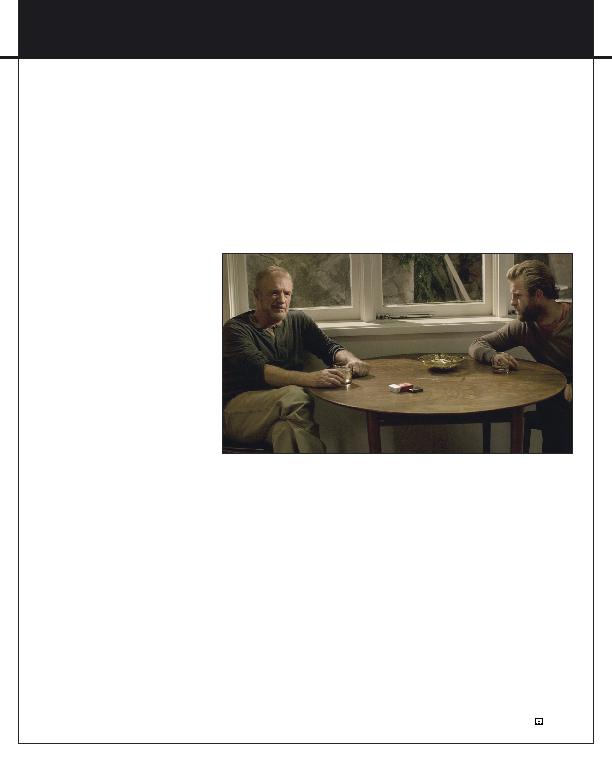
later joined Playhouse West, a theater troop
in Los Angeles. Frustrated with the parts and
plays he was getting, Caan decided to start
work on a play of his own: Almost Love. And
once Caan started writing, he found he
couldn't stop. "I kind of became obsessed
with it," he remembers. "I felt like ideas came
so quickly that if I stopped then I would
never finish. I would literally sit and work for
15 hours at a time. I would sleep, wake up,
eat and write until about five in the morn-
ing. I was banging out two or three screen-
plays a year and three or four plays a year."
he could get his hands on to learn the differ-
ences between good and bad writing. On set,
he would observe the filmmakers and take
inspiration from what he saw. He remembers
his first day on the set of Ocean's Eleven,
when he first saw Steven Soderbergh put the
camera on his shoulder. "I was like, you're
telling me he shoots [the film], too?" he re-
calls. "Being around people like that shows
you what to do and what not to do, but it
also gives you confidence to try it yourself. I
feel like writing is something where you just
have to have confidence in what you're
doing and follow it."
story, Caan prefers the old adage, "write what
you know." His first film, 2003's Dallas 362,
was about young criminals in Texas, an ele-
ment Caan was familiar with in his youth.
The protagonists of his second and third
films, The Dog Problem and Mercy, are writers.
He explains that he wanted his leads to be
artists, but that making them actors or
painters seemed too obvious. "I guess it's
from watching so many Woody Allen
movies," Caan says. "I write about violent
guys and sophisticated writers. I guess that's
the two sides of me."
his days of marathon writing sessions. Now
Caan writes for about two hours a day to hit
his target of five pages. "I still crank out
scripts pretty fast," he says. "It usually takes
me about three months to finish something.
for 10-to-12 hours. Now I have confidence
it'll be there the next day." Once Caan's writ-
ten something he's happy with, he puts it
down for the day. If he still likes it the next
morning, he calls over some actor friends
and they act it out. If it sounds good out loud
and gets the point across, it stays. But if an el-
ement isn't pushing the story forward or
Caan can't justify its presence, it's gone.
Herzog liked the script, but felt it wasn't right
for him. Caan replied that he could rewrite it,
to which Herzog said, "There is no such
thing as rewriting." This made a huge im-
pression on Caan. "I honestly don't think it
was an excuse," Caan says, "he just meant
that what I wrote is what I wrote and if I have
to alter the story enough to get someone in-
terested, then it wasn't their story.
script and tries to get you to change the story
to what they think it should be," he contin-
ues. Caan recounts a time when he sold a
script and spent seven months doing rewrites
afterwards, driving himself crazy to turn his
"Then we had a meeting where they said
they liked the beginning and the end, but
they weren't crazy about the stuff in the mid-
dle," he recalls. "It's like, did you really just
say that casually? `All the stuff in the mid-
dle.' You mean like my script? I mean, this is
my story and my dialogue. If you just like an
idea, steal it and have someone else write it.
Don't buy my script just to change it."
writing before," he ponders. "I've been doing
it for 12 years and I can't really stop doing it.
Every time I write a script, I think that's
gonna be the last script I ever write. But then
I find myself sitting down and writing an-
other. I've never really intellectualized the
process or really even talked about it. Maybe
now that I'm thinking about it, this will be
the end -- and I will blame you."
the eve of the release of his third produced screenplay to reflect
on his process for the very first time.